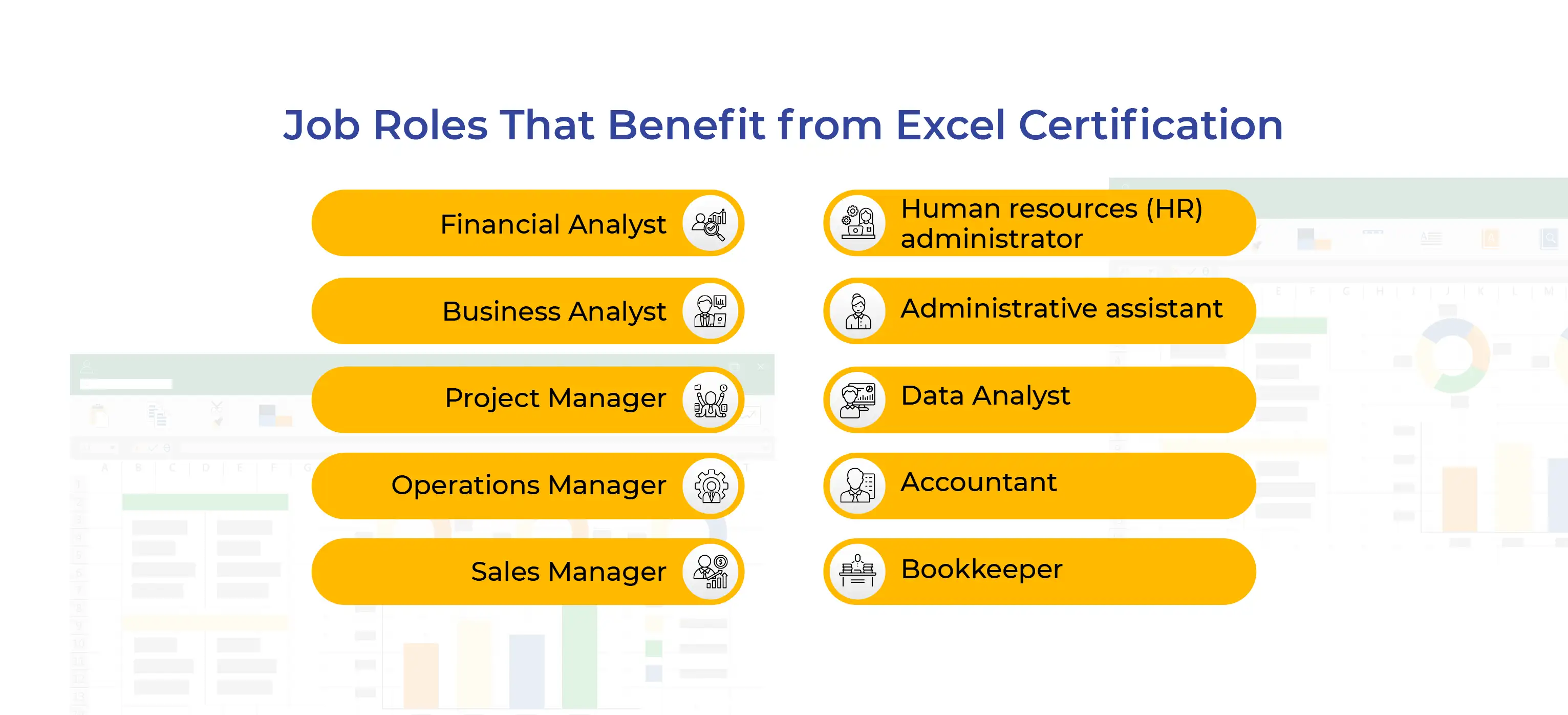 Asim Nath Dubey
Feb 24, 2025
Asim Nath Dubey
Feb 24, 2025

Excel certification can greatly improve job roles in data analysis, financial modeling, reporting, and project management. This includes job roles such as financial analyst, business analyst, data analyst, and administrative assistant.
Since you're considering an Excel certification, you likely already know what Excel is. Nevertheless, let's refresh your understanding. Microsoft Excel is a powerful and versatile spreadsheet software used extensively by businesses to organize, analyze, and manipulate data with incredible efficiency. Even after 30 years, Excel remains an unrivaled and sophisticated piece of software.
Excel is packed with hundreds of powerful functions, formulas, and tricks hidden beneath its simple interface. But with so much to learn, where should you start? The most valuable Excel skills depend on the job you're aiming for!
To help you out, here are the top 10 job roles where having an Excel certification can give you a real edge.
To effectively utilize Excel, it's essential to develop Excel skills across different proficiency levels: beginner, intermediate, and advanced. Each Excel level builds upon the previous one, enabling you to handle increasingly complex tasks.
The table below provides you with an overview of the key Excel skills you should focus on at each level.
| Beginner-level Excel Skills | Intermediate-level Excel Skills | Advanced-level Excel Skills |
|
|
|
Jobs roles that use Excel exist within most sectors and industries. Project managers, analysts, researchers, and other specialists use this spreadsheet software program to record, analyze, and visualize data using elements such as graphs and charts. The following is a list of careers that typically require you to use Excel:
Financial Analyst
Business Analyst
Project Manager
Operations Manager
Sales Manager
Human resources (HR) administrator
Administrative assistant
Data Analyst
Accountant
Bookkeeper
Now let’s take a brief look at each job role;
Financial analysts advise companies on financial matters, including investment decisions. They analyze investment opportunities to determine potential returns and provide guidance to maximize financial performance. According to the US Bureau of Labor Statistics, the employment of financial analysts is projected to grow 9 percent from 2023 to 2033, much faster than the average for all occupations. Excel is one of the top Skills required for Finance Professionals.
A financial Analyst should have advanced Excel skills including PivotTables, INDEX MATCH, charting, forecasting, financial modeling, and scenario analysis.
Here are a few certifications that can help you become a Financial Analyst;
The salary range for a Financial Analyst is around $74,000–$109,000 per year. Accordingly, The estimated total pay for a Financial Analyst is AED 14,558 per month in the Dubai United Arab Emirates. (Based on data gathered from Linkedin, glassdoor, and ZipRecruiter)
Read Also : Top Financial Analysis Tools Every Analyst Should Master
Business analysts collect and analyze data from various sources and are involved in data analysis. Business Analysts need to be proficient in data management, analysis, and visualization. Today, many rely on Microsoft Excel to perform these tasks. With over half of businesses globally using Excel, acquiring expertise in this tool is essential for anyone considering a career in business analytics.
The salary range for a Business Analyst is around $70,000 – $110,000 per year. Consequently, The average salary of a Business Analyst is AED 13,500 per month in the Dubai United Arab Emirates. (Based on data gathered from Linkedin, glassdoor, and ZipRecruiter)
A project manager oversees projects from initiation to completion, ensuring they are delivered on time, within budget, and meet quality standards. Project Managers possess a good understanding of Excel, as it's a valuable tool for organizing, analyzing, and managing project data, including budgets, schedules, and resource allocation.
The salary range for a Project Manager is around $80,000 – $120,000 per year. Additionally, The estimated total pay for a Project Manager is AED 21,325 per month in the Dubai United Arab Emirates. (Based on data gathered from Linkedin, glassdoor, and ZipRecruiter)
An operations manager ensures the smooth functioning of a company’s daily operations, focusing on efficiency and performance improvement. Advanced Excel skills are essential for Operation Managers since they organize, analyze, and manage project data, including budgets, schedules, and resource allocation.
The salary range for an Operations Manager is around $75,000 – $110,000 per year. Additionally, The estimated average salary of an Operations Manager is AED 16,517 per month in the Dubai United Arab Emirates. (Based on data gathered from Linkedin, glassdoor, and ZipRecruiter)
A sales manager leads a team to achieve sales targets, develop client relationships, and drive revenue growth. Excel is an incredibly useful tool for Sales Managers as it offers robust tools for data analysis, tracking sales performance, and forecasting.
Essential Excel skills for salespeople include proficiency in functions such as VLOOKUP, SUMIFS, and PivotTables. A Sales Manager should also be skilled in creating dynamic charts and graphs to effectively visualize sales data. Furthermore, understanding how to use Excel for managing customer information, generating sales reports, and performing basic financial calculations can significantly enhance productivity and support decision-making in sales roles.
The average salary of a Sales Manager is around $70,000 – $120,000 per year (plus incentives/commissions). In addition, the average salary of a Sales Manager is AED 14,500 per month in the Dubai United Arab Emirates. (Based on data gathered from Linkedin, glassdoor, and ZipRecruiter).
An HR administrator manages employee records, recruitment, and workplace policies to ensure smooth HR operations. Excel provides HR professionals with a user-friendly platform for creating, organizing, and analyzing HR-related information. Excel’s features, such as sorting, filtering, and data visualization, contribute to streamlining tasks like recruitment, employee data management, and reporting.
The average salary of an HR Administrator is around $50,000 – $75,000 per year. The average salary of a Human Resource (HR) Administrator is around AED 4,705 in the UAE. (Based on data gathered from Linkedin, glassdoor, and Naukrigulf).
An administrative assistant provides clerical support, manages schedules, and ensures efficient office operations. Excel skills are used in almost every aspect of an admin assistant's role – from managing data and organizing events to tracking budgets and creating reports. Simply Put - Excel is an all-purpose tool for managing office activities.
The average salary of an Administrative Assistant is around $40,000 – $60,000 per year. In addition, The estimated total pay of an Administrative Assistant is AED 4,442 per month in the Dubai United Arab Emirates. (Based on data gathered from Linkedin, glassdoor, and Naukrigulf).
A data analyst collects, processes, and interprets data to help organizations make data-driven decisions. Data Analysts use various tools, programming languages, and applications like Tableau, Python, and Excel to analyze and visualize data. Even though there are numerous other data analysis tools available in the market. Excel remains one of the important applications used by Data Analysts.
The average salary of a Data Analyst is around $65,000 – $110,000 per year. Additionally, The estimated total pay of a Data Analyst is AED 9,396 per month in the Dubai United Arab Emirates area, with an average salary of AED 9,000 per month. (Based on data gathered from Linkedin, glassdoor, and Naukrigulf).
An accountant manages financial records, ensures compliance, and prepares financial reports. Having strong Excel skills in accounting and relevant certifications can elevate your chances for leadership roles and promotions even if you don't have a relevant degree.
A bookkeeper records financial transactions, maintains ledgers, and ensures financial accuracy. To become a successful Bookkeeper, you must be proficient in using Excel functions such as VLOOKUP, PivotTables, and macros to interpret data and generate reports. Having Excel skills not only improves efficiency but also allows for deeper analysis of financial information, enabling better decision-making.
The average salary of a Bookkeeper is around $40,000 – $65,000 per year. Accordingly, The average salary for a Bookkeeper is AED 3906 per month in Dubai. (Based on data gathered from Linkedin, glassdoor, and Naukrigulf).

|
|
Excel has been a trusted companion for decades, particularly for professionals in finance, data analysis, project management, and many other fields. It offers many features, from simple accounting ledgers to creating pivot tables and data visualizations.
According to ZipRecruiter, as of February 2025, professionals with Excel skills earn an average hourly wage of $27.93. Those at the top of the pay scale can earn up to $44 per hour, which translates to an annual salary of approximately $90,500. Furthermore, Excel is mentioned as a job requirement by many top companies. This includes major organizations such as Apple, Amazon, Berkshire Hathaway, Meta, and the card network Visa. Therefore, anyone aiming to get into a top company or advance in the workplace should have solid Excel skills.
Now that you know all about job roles that benefit from Excel certification, the next important step is to upskill or get your Excel Certification. It might not be an easy task to become an Excel power user, however, a committed approach to Excel mastery may be the key to your dream job.

Asim Nath is an Accounting and Microsoft Office trainer at Edoxi Training Institute. He has over 13 years of training experience and has successfully trained more than 3000 professionals in Accounting and Microsoft Office applications. Asim’s specialisations include Financial Accounting, Tally, Zoho and Quickbooks. His background in financial accounting adds valuable insights to business presentation training.
Asim is an expert in MS Office, including PowerPoint, Excel, and Power BI, positioning him as a well-rounded specialist in the Microsoft Suite. Asim employs a practical, business-focused teaching methodology. His one-to-one training approach ensures each student receives personalized attention. He emphasizes real-world applications, helping professionals create impactful business presentations.